- Home
- Jasper Fforde
Something Rotten Page 25
Something Rotten Read online
Page 25
That evening, as I was reading Pinocchio to Friday, a large tabby cat appeared on the wardrobe in my bedroom. It didn't appear instantly, either — it faded in from the tip of its tail, all the way up to its very large grin. When he first started working in Alice in Wonderland he was known as 'The Cheshire Cat' but the authorities moved the Cheshire county boundaries and he thus became 'The Unitary Authority of Warrington Cat', but that was a bit of a mouthful so he was known more affectionately as 'The Cat Formerly Known as Cheshire' or, more simply, 'The Cat'. His real name was 'Archibald' but that was reserved for his mother when she was cross with him.
He worked very closely with us at Jurisfiction, where he was in charge of the Great Library, a cavernous and almost infinite depository of every book ever written. But to call the Cat a librarian would be an injustice. He was an Uberlibrarian — he knew about all the books in his charge. When they were being read, by whom — everything. Everything, that is, except where Yorrick Kaine was a featured part. Friday giggled and pointed as the Cat stopped appearing and stared at us with a grin etched on his features, eagerly listening to the story.
'Hello!' he said as soon as I had finished, kissed Friday and put out the bedside light. 'I've got some information for you.'
'About?'
'Yorrick Kaine.'
I took the Cat downstairs, where he sat on the microwave as I made some tea.
'So what have you found out?'
'I've found out that an alligator isn't someone who makes allegations — it's a large reptile a bit like a crocodile.'
'I mean about Kaine.'
'Ah. Well, I've had a careful trawl and he doesn't appear anywhere in the character manifests either in the Great Library or the Well of Lost Plots. Wherever he's from, it isn't from published fiction, poetry, jokes, non-fiction or knitting patterns.'
'I don't believe you'd come out here to tell me you've failed, Chesh,' I said. 'What's the good news?'
The Cat's eyes flashed and he twitched his whiskers.
'Vanity publishing!' he announced with a flourish.
It was an inspired guess. I'd never even considered he might be from there. The realm of the self-published book was a bizarre mix of quaint local histories, collections of poetry, magna opera of the truly talentless - and the occasional gem. The thing was, if they became officially published they were welcomed into the Great Library with open arms - and that hadn't happened.
'You're sure?'
The Cat handed me an index card.
'I knew this was important to you so I called in a few favours.'
I read the card aloud.
'At Long Last Lust, 1931. Limited edition run of one hundred. Author: Daphne Farquitt.'
1 looked at the Cat. Daphne Farquitt. Writer of nearly five hundred romantic novels and darling of the Romance genre.
'Before she was famous writing truly awful books she used to write truly awful books that were self-published,' explained the Cat. 'In At Long Last Lust, Yorrick plays a local politician eager for self-advancement. He isn't a major part, either. He's only mentioned twice and doesn't even warrant a description.'
'Can you get me into the vanity publishing library?' I asked.
'There is no vanity library,' the Cat said with a shrug. 'We have figures and short reviews gleaned from vanity publishers' manifests and Earnest Scribbler Monthly, but little else. Still, we need only to find one copy and he's ours.'
He grinned again but I didn't join him.
'Not that easy, Cat. Take a look at this.'
I showed him the latest issue of The Toad. The Cat carefully put on his spectacles and read: 'Danish book-burning frenzy reaches new heights with Copenhagen-born Farquitt's novels due to be consigned to flames.'
'I don't get it,' said the Cat, placing a yearning paw on a Moggilicious Cat Food advert, 'what's he up to burning all her books?'
'Because,' I said, 'he obviously can't find all the original copies of At Long Last Lust and in desperation has whipped up anti-Danish feeling as a cover. With luck his book-burning idiots will do the job for him. I'm a fool not to have realised. After all, where would you hide a stick?'
There was a long pause.
'I give up,' said the Cat, 'where would you hide a stick?'
'In a forest.'
I stared out of the window thoughtfully. At Long Last Lust. I didn't know how many of the hundred copies still remained, but with Farquitt's books still being consigned to the furnaces I figured there had to be at least one. An unpublished Farquitt novel the key to destroying Kaine. I couldn't make this stuff up.
'Why would you hide a stick in a forest?' asked the Cat, who had been pondering this question for some moments in silence.
'It's an analogy,' I explained. 'Kaine needs to get rid of every copy of At Long Last Lust but doesn't want us to get suspicious, so he targets the Danes - the forest - rather than Farquitt - the stick. Get it?'
'Got it.'
'Good.'
'Well, I'd better be off, then,' announced the Cat, and he vanished.
I was not much surprised at this for the Cat usually left in this manner. I poured the tea, added some milk and then put some mugs on a tray. I was just pondering where I might find a copy of At Long Last Lust and, more importantly, thinking of calling Julie again to ask her how long her husband flicked on and off 'like a light bulb' when the Cat reappeared balanced precariously on the Kenwood mixer.
'By the by,' he said, 'the Gryphon tells me that the sentencing for your fiction infraction is due in two weeks' time. Do you want to be present?'
This related to the time I had changed the ending to Jane Eyre. They found me guilty at my trial but the law's delay in the BookWorld just dragged things on and on.
'No,' I said after a pause. 'No, tell him to come and find me and let me know what my sentence will be.'
'I'll tell him. Well, toodle-oo,' said the Cat, and vanished, this time for good.
I pushed open the door of Mycroft's workshop with my toe, held it open for Pickwick to follow me in, then closed it before Alan could join us and placed the tray on a worktop. Mycroft and Polly were staring intently at a small and oddly shaped geometric solid made of brass.
'Thank you, pet,' said Polly. 'How are things with you?'
'Fair to not very good at all, Auntie.'
Polly was Mycroft's wife of some forty-two years and although seemingly in the background was actually almost as brilliant as her husband. She was a bouncy seventy and managed Mycroft's often irascible and forgetful nature with a patience that I found inspiring. 'The trick,' she told me once, 'is to regard him like a five-year-old with an IQ of two hundred and sixty.' She picked up her tea and blew on it.
'Still thinking about whether to put Smudger on defence?'
'I was thinking of Biffo, actually.'
'Smudger and Biffo would both be wasted on defence,' muttered Mycroft, making a fine adjustment on one face of the brass polyhedron with a file. 'You ought to put Snake on defence. He's untried, I admit, but he plays well and has youth on his side.'
'Well, I'm really leaving team strategy to Aubrey.'
'I hope he's up to it. What do you make of this?'
He handed me the solid and I turned the grapefruit-sized object over in my hands. Some of the faces were odd sided and some even sided — and some, strangely enough, appeared to be both. My eyes had trouble making sense of it.
'Very . . . pretty,' I replied. 'What does it do?'
'Do?' Mycroft smiled. 'Put it on the worktop and you'll see what it does!'
I placed it on the surface but the oddly shaped solid, unstable on the face I had placed it upon, tipped on to another. Then, after a moment's pause, it wobbled again and fell on to a third. It carried on in this jerky fashion across the worktop until it fell against a screwdriver, where it stopped.
'I call it a Nextahedron,' announced Mycroft, picking up the solid and placing it on the floor, where it continued its random perambulations, watched by Pickwick, who thought it might be chas
ing her, and ran away to hide. 'Most irregular solids are only unstable on one or two faces. The Nextahedron is unstable on all its faces - it will continue to fall and tip until a solid object impedes its progress.'
'Fascinating!' I murmured, always surprised by the ingenuity of Mycroft's inventions. 'But what's the point?'
'Well,' explained Mycroft, warming to the subject, 'you know those inertia! generator things that self-wind a wristwatch?'
'Yes?'
'If we have a larger one of those inside a Nextahedron weighing six hundred tons, I calculate we could generate as much as a hundred watts of power.'
'But. . . but that's only enough for a light bulb!'
'Considering the input is nil, I think it's a remarkable achievement,' replied Mycroft somewhat sniffily. 'To generate significant quantities of power we'd have to carve something of considerable mass - Mars, say — into a huge Nextahedron with a flat plate falling around the exterior, held firm by gravity. The power could be transmitted to earth using Tesla beams and . . .'
His voice trailed off as he started to sketch ideas and equations in a small notebook. I watched the Nextahedron fall and rock and jiggle across the floor until it fell against a roll of wire.
'On a more serious note,' confided Polly, putting down her tea, 'you could help us identify some of the devices in the workshop. Since both Mycroft and I have taken the Big Blank you might be able to help.'
'I'll try,' I said, looking around the room at the bizarre devices. 'That one over there guesses how many pips there are in an unopened orange, the one with the horn is an Olfactrograph for measuring smells, and the small box thing there can change gold into lead.'
'What's the point of that?'
'I'm not entirely sure.'
Polly made notes against her inventory and I spent the next ten minutes trying to name as many of Mycroft's inventions as I could. It wasn't easy. He didn't tell me everything.
'I'm not sure what this one is, either,' I said, pointing at a small machine about the size of a telephone directory lying on a workbench.
'Oddly enough,' replied Polly, 'this is one we do have a name for. It's an ovinator.'
'How do you know if you can't remember?'
'Because,' said Mycroft, who had finished his notes and now rejoined us, 'it has "ovinator" engraved on the case just there. We think it's either a device for making eggs without the need of a chicken, or for making chickens without the need of an egg. Or something else entirely. Here, I'll switch it on.'
Mycroft flicked a switch and a small red light came on.
'Is that it?'
'Yes,' replied Polly, staring at the small and very unexciting metallic box thoughtfully.
'No sign of any eggs or chickens,' I observed.
'None at all.' Mycroft sighed. 'It might just be a machine for making a red light come on. Drat my lost memory! Which reminds me: any idea which device actually is the memory eraser?'
We looked around the workshop at the odd-looking and mostly anonymous contraptions. Any one of them may have been used to erase memories, but then any one of them may have been a device for coring apples, too.
We stood in silence for a moment.
'I still think you ought to have Smudger on defence,' said Polly, who was probably the biggest croquet fan in the house.
'You're probably right,' I said, suddenly feeling that it would be easier just to go with the flow. 'Uncle?'
'Polly knows best,' he replied. 'I'm a bit tired. Who wants to watch Name That Fruit on the telly?'
We all agreed that it would be a relaxing way to end the day and I found myself watching the nauseating quiz show for the first time in my life. I realised just how bad it was halfway through, and went to bed, temples aching.
30
Neanderthal Nation
NEANDERTHALS 'OF USE' AT POLITICIANS' TRAINING COLLEGE
Neanderthals, the re-engineered property of the Goliath Corporation, found unexpected employment at the Chipping Sodbury College for Politicians yesterday when four selected individuals were inducted as part of the 'Public Office Veracity Economies' class. Neanderthals, whose high facial acuity skills make them predisposed to noticing an untruth, are used by students to hone their lying skills — something that trainee politicians might find useful once in office. 'Man, those Thals can spot everything!' declared Mr Richard Dixon. a first-year student. 'Nothing gets past them — even a mild embellishment or a tactical omission!' The lecturers at the college declared themselves wholly pleased with the Neanderthals and privately admitted that: 'If the proletariat were even half as good at spotting lies, we'd really be in the soup!"
Article in The Toad (political section). 4 July 1988
The hunt for At Long Last Lust had been going on all morning but with little success. Kaine had almost two years' head start on us. Of the one hundred copies in the print run, sixty-two had changed hands within the past eighteen months. Initially they had been for modest sums of a thousand pounds or so, but there is nothing like a mystery buyer with deep pockets to push up the price and the last copy sold was for £720,000 at Agatha's Auction House - an unprecedented sum, even for a pre-war Farquitt.
The likelihood of finding a copy of Lust was looking increasingly slim. I called Farquitt's agent, who said that the author's entire library had been confiscated and the septuagenarian author questioned at length about pro-Danish political activism before being released. Even a visit to the Library of Farquitt in Didcot didn't bear any fruit - their original manuscript of At Long Last Lust and a signed copy had both been seized by 'government agents' nearly eighteen months before. The librarian met us in the sculpted marble hall and, after telling us not to talk so loudly, reported that representative copies of all Farquitt's works were packed and ready for removal 'as soon as we wanted'. Bowden responded that we'd be heading towards the border just as soon as we finalised the details. He didn't look at me as he said it but I knew what he was thinking - I still needed to figure out a way to get us across the border.
We drove back to the LiteraTecs' office in silence, and as soon as we got in I called Landen. My wedding ring, which had been appearing and disappearing all morning, had been solid for a good twenty minutes.
'Yo, Thursday!' he said enthusiastically. 'What happened to you yesterday? We were talking and you just went quiet.'
'Something came up.'
'Why don't you come round for lunch? I've got fish fingers, beans and peas - with mashed banana and cream for pudding.'
'Have you been discussing the menu with Friday?'
'Whatever made you think that?'
'I'd love to, Land. But you're still a bit existentially unstable at the moment, so I'd only end up embarrassing myself in front of your parents again - and I've got to go and meet someone to talk about Shakespeares.'
'Anyone I know?'
'Bartholomew Stiggins.'
'The Neanderthal?'
'Yes.'
'Hope you like beetles. Call me when I exist next. I lo—'
The line went dead. My wedding ring had gone again too.
I listened to the dial tone for a moment, tapping the receiver thoughtfully on my forehead.
'I love you too, Land,' I said softly.
'Your Welsh contact?' asked Bowden, walking up with a fax from the Karen Blixen Appreciation Society.
'Not exactly.'
'New players for the Superhoop, then?'
'If only. Goliath and Kaine have frightened every player in the country except Penelope Hrah, who'll play for food and doesn't care what anyone says, thinks or does.'
'Didn't she have a leg torn off during the Newport Strikers versus Dartmoor Wanderers semi-final a few years back?'
'I'm in no position to be choosy, Bowd. If I put her on back-hoop defence she can just growl at anyone who comes close. Ready for lunch?'
The Neanderthal population of Swindon numbered about three hundred and they all lived in a small village to the west known as 'The Nation'. Because of their tool-using prowe
ss, they were just given six acres of land, water and sewage points and told to get on with it, as if they needed to be asked, which they didn't.
The Neanderthals were not human nor descendants of ours, but cousins. They had evolved at the same time as us, then been forced into extinction when they failed to compete successfully with the more aggressive human. Brought back to life by Goliath Bioengineering in the late thirties and early forties, they were as much a part of modern life as dodos or mammoths. And since they had been sequenced by Goliath, each individual was actually owned by the corporation. A less than generous 'buy-back' scheme to be able to purchase oneself hadn't been well received.
We parked a little way down from the Nation and got out of the car.
'Can't we just park inside?' asked Bowden.
'They don't like cars,' I explained. 'They don't see the point in travelling any distance. To Neanderthal logic, anywhere that couldn't be reached in a day's walk isn't worth visiting. Our Neanderthal gardener used to walk the four miles to our house every Tuesday, and then walk back again, resisting all offers of a lift. Walking was, he maintained, "the only decent way to travel — if you drive you miss the conversations in the hedgerows".'
'I can see his point,' replied Bowden, 'but when I need to be somewhere in a hurry—'
'That's the difference, Bowd. You've got to get away from the human way of thinking. To Neanderthals, nothing is so urgent that it can't be done another time — or not done at all. By the way, did you remember not to wash this morning?'
He nodded. Because scent is so important to Neanderthal communications, the soapy cleanliness of humans reads more like some form of suspicious subterfuge. Speak to a Neanderthal while wearing scent and they'll instantly think you have something to hide.
We walked through the grassy entrance of the Nation and encountered a lone Neanderthal sitting on a chair in the middle of the path. He was reading the large-print Neanderthal News. He folded up the paper and sniffed the air delicately before staring at us for a moment or two and then asking:
'Who do you wish to visit?'

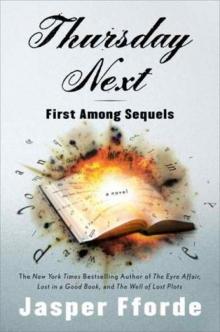 First Among Sequels
First Among Sequels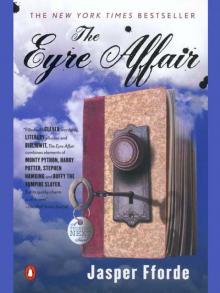 The Eyre Affair
The Eyre Affair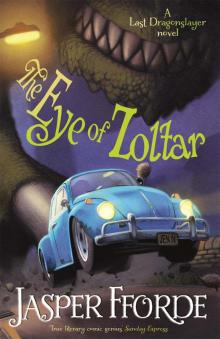 The Eye of Zoltar
The Eye of Zoltar The Woman Who Died a Lot
The Woman Who Died a Lot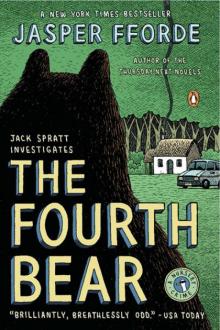 The Fourth Bear
The Fourth Bear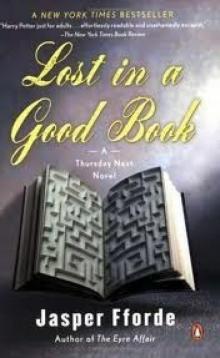 Lost in a Good Book
Lost in a Good Book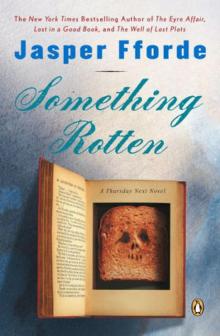 Something Rotten
Something Rotten The Well of Lost Plots
The Well of Lost Plots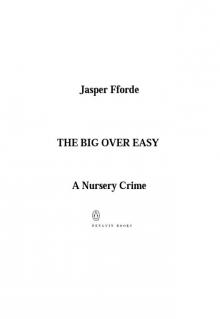 The Big Over Easy
The Big Over Easy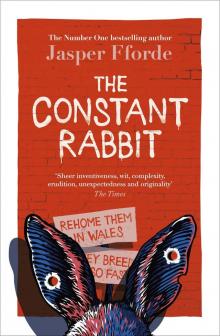 The Constant Rabbit
The Constant Rabbit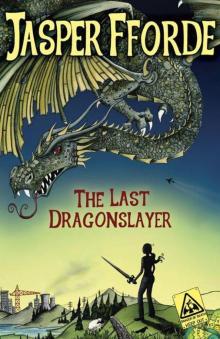 The Last Dragonslayer
The Last Dragonslayer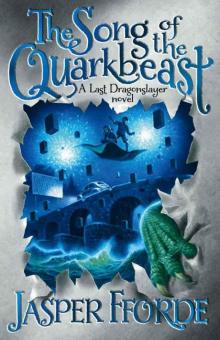 The Song of the Quarkbeast
The Song of the Quarkbeast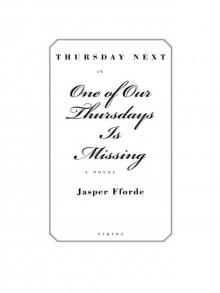 One of Our Thursdays Is Missing
One of Our Thursdays Is Missing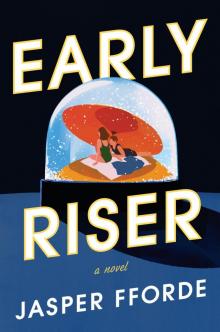 Early Riser
Early Riser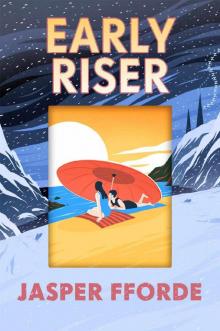 Early Riser_The new standalone novel from the Number One bestselling author
Early Riser_The new standalone novel from the Number One bestselling author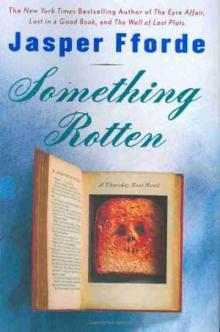 Something rotten n-4
Something rotten n-4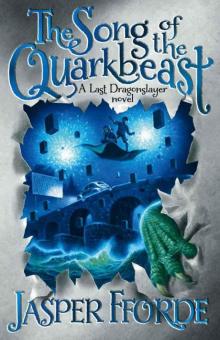 The Song of the Quarkbeast tld-2
The Song of the Quarkbeast tld-2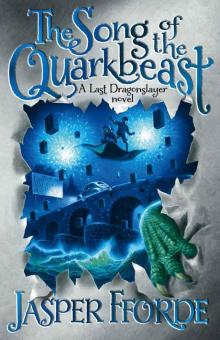 The Song of the Quarkbeast: Last Dragonslayer: Book Two
The Song of the Quarkbeast: Last Dragonslayer: Book Two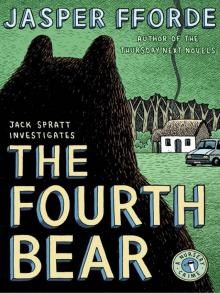 The Fourth Bear nc-2
The Fourth Bear nc-2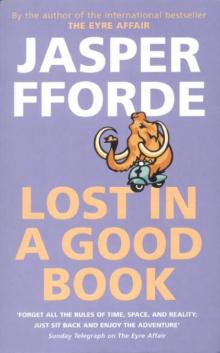 Lost in a Good Book tn-2
Lost in a Good Book tn-2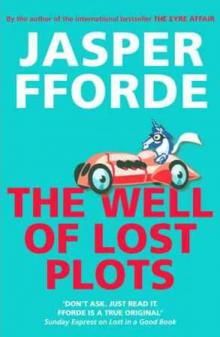 The Well of Lost Plots n-3
The Well of Lost Plots n-3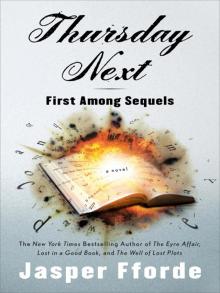 Thursday Next in First Among Sequels
Thursday Next in First Among Sequels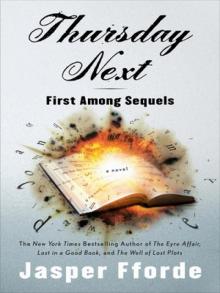 First Among Sequels tn-5
First Among Sequels tn-5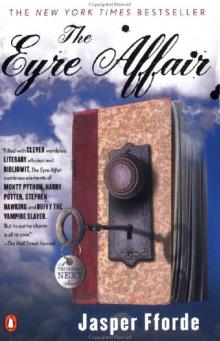 The Eyre Affair tn-1
The Eyre Affair tn-1